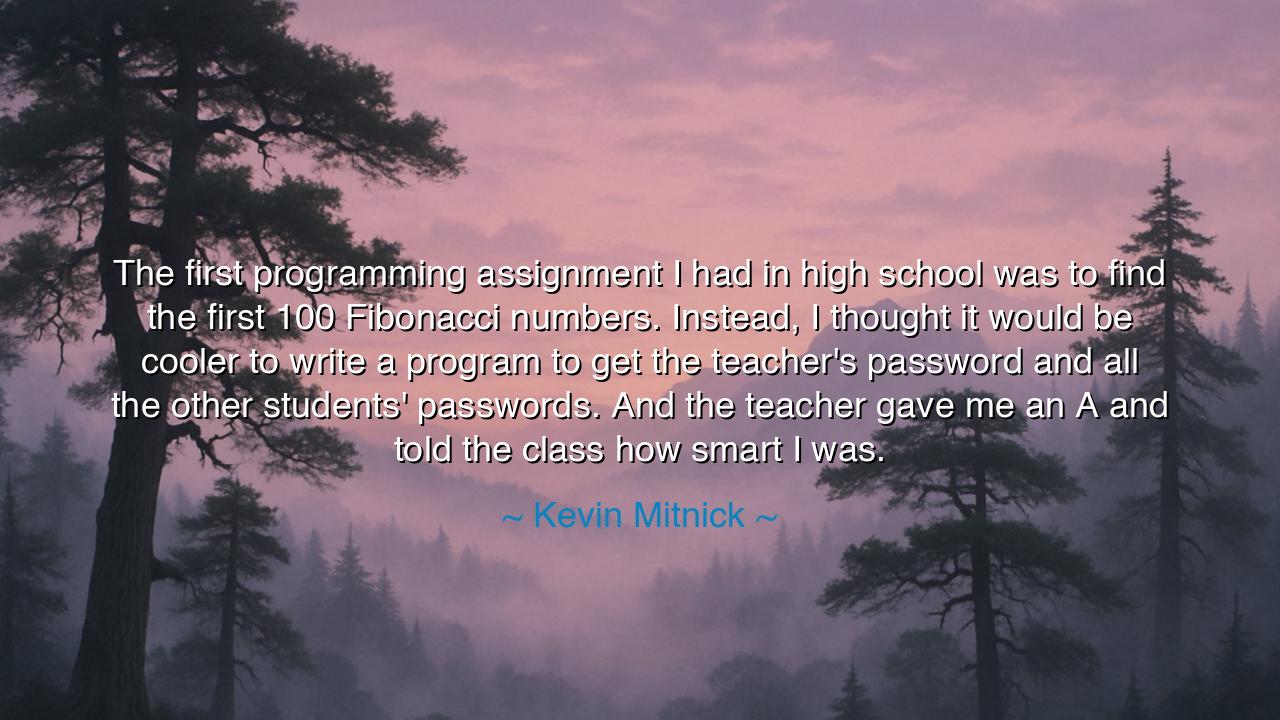
The first programming assignment I had in high school was to
The first programming assignment I had in high school was to find the first 100 Fibonacci numbers. Instead, I thought it would be cooler to write a program to get the teacher's password and all the other students' passwords. And the teacher gave me an A and told the class how smart I was.






The legendary hacker Kevin Mitnick, whose name became synonymous with the frontiers of digital exploration, once recalled his youth with these words: “The first programming assignment I had in high school was to find the first 100 Fibonacci numbers. Instead, I thought it would be cooler to write a program to get the teacher's password and all the other students' passwords. And the teacher gave me an A and told the class how smart I was.” This remembrance, though tinged with humor, reveals profound truths about curiosity, rebellion, and the delicate line between genius and mischief. It is a tale of a boy who, when given a path, chose instead to blaze his own trail, and in doing so, uncovered a destiny.
The teacher asked for Fibonacci numbers, that timeless sequence found in the spirals of shells and the unfurling of leaves. It was a task of order, beauty, and predictability. But Mitnick’s mind, restless and hungry, did not dwell in order alone. He chose instead the hidden path—the path of secrets and systems, of keys and locks. He sought not only to solve the problem given, but to transcend the boundaries of the problem itself, exposing the unseen structure beneath the classroom’s digital world. To some, this was disobedience; to others, it was brilliance.
In rewarding him with an A, the teacher revealed a wisdom of their own. Rather than condemning him for straying from the assignment, they celebrated his ingenuity. For they saw that true learning lies not in repeating instructions, but in daring to ask: What else is possible? In this moment, the teacher acted as more than an instructor; they became a midwife to genius, allowing the boy to glimpse the power of his own mind and encouraging him to explore further. This act of recognition may well have been one of the sparks that carried Mitnick forward on the path that made him both feared and revered in the digital age.
History is filled with similar tales. Galileo, when asked by authority to chart the heavens according to the doctrines of his time, looked instead through his telescope and uncovered truths that shattered the old world. Ada Lovelace, given the task of explaining Charles Babbage’s machine, went further and imagined a future where machines could compose music and create art. In each case, the genius lay not in completing the assignment as written, but in pushing beyond the given boundaries. Mitnick’s high school moment belongs to this lineage of restless seekers.
Yet there is a warning in this story as well. For while the path of genius often begins with curiosity and defiance, it can also slip into arrogance and destruction if not tempered by wisdom. Mitnick himself would later walk both sides of this line—celebrated for his brilliance, pursued for his exploits, and ultimately transformed into a teacher of security. His life reminds us that raw intellect must be guided by ethics, that the same gift that uncovers vulnerabilities must also learn to protect and to serve. Knowledge is power, and power demands responsibility.
The deeper meaning of his story is that human progress depends upon those who look beyond the obvious assignment. The world does not advance by those who only solve the problems given, but by those who seek out the hidden ones. The hacker’s spirit, when purified of malice, is nothing less than the inventor’s spirit, the explorer’s spirit, the artist’s spirit: it is the refusal to accept limits. In Mitnick’s boyhood mischief we glimpse the eternal fire of curiosity that drives humanity itself.
The lesson for us is thus twofold. First, honor curiosity, even when it disobeys the letter of the law, for it may reveal genius. Second, temper curiosity with wisdom, lest it turn from gift to danger. Practically, this means encouraging young minds to explore, to innovate, to test boundaries—while also instilling in them the humility to consider the consequences of their actions. To teachers, it is a call to celebrate ingenuity, not punish it blindly. To students, it is a reminder that true brilliance lies not only in what you can do, but in what you choose to do with your gifts.
Thus, Kevin Mitnick’s words echo as more than a youthful memory. They are a parable of the rebellious mind, the spark of genius that will not be confined to given paths. And they remind us all that within every classroom, every child, lies the possibility of world-shaking discovery—if only we dare to look beyond Fibonacci, and into the hidden systems of life itself.






AAdministratorAdministrator
Welcome, honored guests. Please leave a comment, we will respond soon